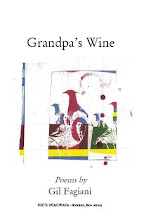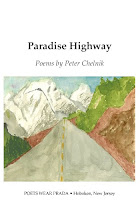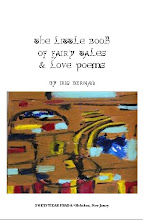Reprinted from Sentinel Literary Quarterly, April-June-2017, p. 70 - 71
The B Poems
Author: Simon Perchik
Publisher: Poets Wear Prada
ISBN: 9 78 - 0692450697
Reviewer: Mandy Pannett
In his article "Magic, Illusion and Other Realities," published in Sentinel Literary Quarterly, October 2016, Simon Perchik offers a definition of poetry as "words that inform the reader of that which cannot be articulated ... Text need not always have a meaning the reader can explicate ... it informs, as does music, without what we call meaning." In The B Poems we see this philosophy put into practice: the book is non-linear, the poems may be read in any order, there is no apparent direction or meaning, everything is "Just below the surface" as we sense " the endless under and under." These are ideas that particularly appeal to me. I love the concept of the poet’s subconscious interacting with that of the reader. It feels similar to Emily Dickinson’s maxim "Tell all the truth but tell it slant" -- but with Simon Perchik there is no "telling." He allows words to align, associate , suggest, juxtapose, connect themselves to an infinite variety of emotions and experiences. As he says in the poem B6, "the earth leans against you / from inside, starts its turn / hand over hand." There are many examples of associations and juxtapositions in The B Poems. Some I particularly appreciate are:
"the way every star / smells from dying winds and grass"
"the way this tiny rock / is pulling you closer / wingtip to wingtip / is swallowing you / as if one by one / its feathers had opened"
"what makes the door shriek / is just its darkness reaching out / for crumbs, hungry, terrified"
Then there is this verse which I’ll quote in full:
Its ink is heavier at night
though you can still hear the hum
from some sea already faint
when sunlight too was blac
lost, floated lifeless
Associations in this collection interweave, repeat and echo. Through all the poems there are images of rain, tombstones, dirt , graves, circles, arms, lips, wind, waves, sky, sun , blossom and shadow -- a great deal of shadow. There is a sense of something incomplete, reflected, glimpsed and soon vanishing. Here It is "half nightfall, half / no longer warm"; we learn that "you die / in two places at the same time"; in an image of rowing a boat one is moved "left, right, swinging your arms / half moonlight, half almost makes out / the words rising from empty shells." This shadow is constant and always "half/reaching out, breaking loose."
Simon Perchik's poems strikes me as exceptionally original. Not only are they written without a narrative or apparent theme but, apart from the enigmatic Bs, they have no titles to lead the reader in a predetermined direction. In his other collections verses form an even looser sequence, delineated only by asterisks. The writing is seamless, musical and rhythmically hypnotic, syntactically ambiguous and sounds intriguingly out of kilter to the ear:
... and what you swallowThe mood is sad in The B Poems. There is grief at "your mouth / no longer lit for kisses / and songs about nothing" and the bleakness of death surrounds everything in "a mist / half ice, half crushed between/the first caress and darkness." There is such poignancy in the scene where "after the funeral / you drown in the row by row / where each photograph is overturned / shaken loose from the family album." These are the dead who don’t know they are dead who are still "holding hands / and what’s left they share / as memories ... for the grandchildren you almost forgot ... they mix up dates and places ... form a circle / as if they still expect to sing out loud / and you would hear it ..." Yet these are visionary poems which of fer the chance to repair, and heal, to make whole. At the end, the poet suggests, the unfinished will be made complete in ‘that slow love song/ from before the sun grew huge’ and there will be a reuniting with the other half, the double, the twin --
is already shoreline
huddled around this table
and your lips in the open
the way small stones are left
to help the dead wander back
as the dim light they make
and any moment now.
... in the darkness
that belongs to you both.


































































